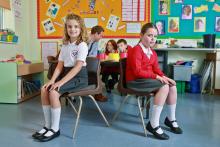
STAT’s school chairs campaign and petition which we launched two years ago, calling for a stop to the use of backward sloping chair seats in schools, is celebrating success following the publication of a new European Standard.
We lobbied The European Committee for Standardisation (CEN), a major provider of European Standards and technical specifications based in Brussels, to reassess the proposed update to the Standard which would have further increased the backward angle of school chair seat to minus 10 degrees.
The proposed increase of backward slope would have put children at even greater risk of back problems and likened such chairs to sitting on a hillside facing upwards whilst trying to write.
Our campaign also called for the introduction of a plus 10 degree forward tilt to school chair seat technical specifications thus creating chairs with a slight forward tilt and requested that further scientific research be commissioned into how school furniture can affect children’s wellbeing.
Following our Society’s intervention, the new European Standard that has recently been published includes new technical specifications which has taken the majority of STAT’s concerns into account. Now, a school chair may be manufactured with a seat angle range from a plus seven degree forward tilt (not previously included) to a minus five degree backward tilt. Whilst we still oppose any backward tilt, we consider the outcome a major milestone in its campaign, as we have successfully averted the proposed minus 10 degree backward sloping seat which would have been disastrous for the future of children’s backs, as well as allowing schools to use forward sloping chairs if they wish.
Our spokesperson Richard Brennan, who spearheaded STAT’s school chair campaign, said: “It was incredibly worrying that a new European Standard would have allowed school chairs to get much worse than they already are. We just had to do something about it.
“Backward sloping chair seats encourage children to adopt poor posture whilst writing – they either hunch forward over their desks causing their spines to bend or they tense up all their muscles to maintain an upright posture. They eventually slump to seek support from the chair back and this places the weight behind the tail bone (coccyx) rather than on the sitting bones.
“I believe that poor postural habits are one of the major causes of back and neck pain in both children and adults. We need to encourage children to maintain good posture for life and sitting correctly on well-designed furniture in schools will help them to do that.”
The campaign highlighted that the majority of UK pupils spend more than 15,000 hours during their school life sitting on backward-sloping chairs which are not designed for use with a standard flat surface school desk.
The reality of the impact that this has, not only on the nation’s back health but on the ability of children to even breathe properly to sustain concentration in the classroom, formed the basis of STAT’s presentations to various CEN committees across Europe.
“We needed to demonstrate that a chair must put the postural needs of the user first; not just be a design that stacks easily. The new Standard is a huge step forward but it could still take years for us to see real changes in the classroom”, Richard Brennan says.
“We’re not expecting schools to throw away all their furniture overnight but this problem must be addressed in both the short and long term. Right now, existing school furniture could be improved by introducing chair or writing wedges – preferably both. And it is absolutely vital that new furniture introduced into educational establishments is in no way detrimental to children’s learning and health.
“Almost half of the population suffers with back pain and we are already seeing an entire generation of back pain sufferers coming through. What’s concerning is that back pain caused by poor posture can be a slow and subtle injury.
“The cause of the damage starts at a young age in our schools and then really takes a grip later in life. Millions of working days lost due to back pain and other musculoskeletal disorders each year are testament to that.
“The new Standard is a step in the right direction and we must now turn our attention to educating the schools themselves so they can make informed decisions about the furniture they buy.”
A study is already underway at Claddagh primary school in Galway where 24 pupils are using school chairs with an eight degree forward seat slope to assess the impact on their wellbeing and learning. Results are expected in Autumn 2016.